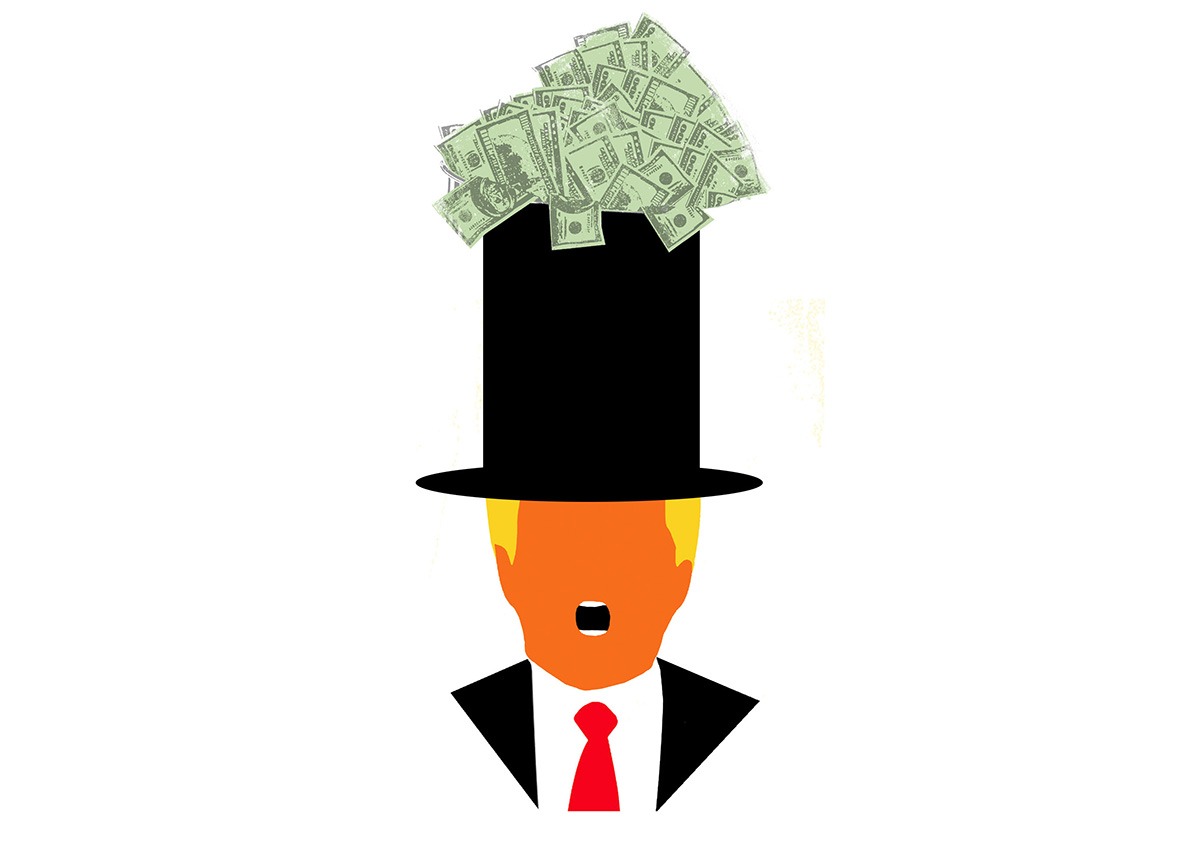On January 1, 2018, the United States began an experiment with its future, as the new tax bill—drafted in secrecy, passed along party lines by Republicans in Congress, and signed by President Trump—went into effect. While Republicans claim that their tax bill will help the middle class and the U.S. economy, nothing can be further from the truth.
The bill contains three main provisions. First, the corporate income tax rate falls from 35 to 21 percent; owners of some noncorporate businesses also benefit from lower tax rates. Second, inheritance taxes are cut. A married couple can now leave, untaxed, $22 million to their heirs—double the 2017 amount. This provision helps only the wealthiest 0.1 percent of all families in America.
Third, the bill makes a large number of changes to the individual income tax code. Again, the wealthy gain disproportionately from these changes, primarily because the top tax rate was reduced from 39.6 percent to 37 percent; they also gain because stock prices and dividends will rise as corporations pay fewer taxes to the government. For everyone else, it is a crapshoot. Some will pay a little bit more; others will pay a bit less—at least during the next few years.
People living in high-tax states will be among the losers because it will be more difficult for them to deduct state and local taxes on their federal income tax returns. Homeowners will also lose because a higher standard deduction reduces the mortgage interest that they can deduct. Making homeownership more expensive (after taxes) also lowers home prices. This is particularly damaging for middle-class families whose home constitutes their main asset.
The total cost to the government of these provisions has been estimated at somewhere between $1 trillion and $1.5 trillion over the next 10 years, depending on the growth rate of the U.S. economy. The corporate tax cut accounts for the largest share of lost tax revenues.
A Senate filibuster by Democrats would have killed the tax bill. To prevent a filibuster, Senate rules require that after 10 years, the tax bill will not increase the U.S. budget deficit (based on estimates by the Joint Committee on Taxation) beyond what it would have been without the bill. This required Republicans to make a choice regarding what happens starting in 2028. They decided to aid the rich and bleed everyone else. The tax bill maintains the estate and corporate tax cuts, as well as the cut in the top tax rate. On the other hand, middle-income households will have to pay higher taxes in order to keep the federal debt in check.
This strategy is extremely risky. We have never tried to do anything like this before and have little data to evaluate the consequences of such a tax policy. The closest we have come is when the administrations of Ronald Reagan (1981) and George W. Bush (2001 and 2003) passed large tax cuts for individuals that mainly went to the very wealthy.
In 1982 and 2004, due to these tax cuts, the U.S. budget deficit increased sharply as a percentage of GDP (the income our nation has to pay back our debt). The 2001 tax cuts turned a large budget surplus into a large deficit. In all three cases, government deficits grew much more than estimated before the bill was passed.
The tax bill is also risky because it was passed with no public hearings and without giving economists and tax accountants a chance to analyze it and point out problems. Many, many things can go wrong that were not anticipated. My three main concerns are what happens to the incomes of average American families, what happens to government debt, and what happens to the traditional role of our government as a result of this new tax law.
The tax bill is also risky because it was passed with no public hearings and without giving economists and tax accountants a chance to analyze it and point out problems.
First, incomes. Average U.S. families have not done well during the past 30 to 40 years. According to my research, the U.S. middle class declined by around 10 percentage points from the late 1970s to the middle 2010s—from nearly 60 percent of all U.S. households to 50 percent of all households. At the same time, the share of total income in the country going to the middle 60 percent of U.S. households fell from 53 percent to 46 percent. None of the tax cuts enacted since 1981 advanced the middle class or led to a larger share of total income going to middle-income groups; rather, the middle class began shrinking just as the wealthy got large tax cuts.
During these years, most other developed nations did not substantially cut taxes for their wealthiest citizens. The size of the middle class in these countries remained relatively stable and now far exceeds that in the U.S. In France and Sweden, for example, the middle class has actually grown since the 1970s.
Even these dismal figures hide some additional problems that plague average American families but not middle-class families in other developed countries. Consumer debt (which includes all debt other than for homeownership) has been rising sharply since the 1980s. Households are using current income to pay interest on a regular basis and also to repay some of what they owe. This gives people less money for purchasing necessities and lowers their standard of living.
Supporters of the tax bill contend we don’t have to worry because corporate income tax cuts will increase worker pay and hiring. I doubt this. Over the past 30 to 40 years, starting with tax cuts geared to the rich and business deregulation during the Reagan era, neither the U.S. economy nor the U.S. middle class have done well. Only the very wealthy (the top 1 percent) have thrived. There is little reason to think that things will be different this time.
A few firms have announced end-of-year bonuses for their workers because the tax bill was passed and will lower their taxes. For example, AT&T will give $1,000 to every employee. However, at the same time, they announced that 600 workers will be laid off.
And bonuses given to workers right now need to be seen in historical context. For several decades, real wages (the purchasing power of worker wages) have changed little despite the fact that workers have been much more productive in the workplace. Over the past year, real wages have not increased at all, even though the unemployment rate sits near 4 percent, a level where wage pressures should develop. It’s also important to remember that these bonuses are not pay increases that will carry forward to future years—they are a one-time payment to workers.
I am also not optimistic that the much-promised hiring boom will materialize. Many firms have already said they will use their tax windfall to do more of what they have already been doing for years—buying back existing corporate stock and paying higher dividends to wealthy shareholders, rather than investing in the future of the company.
This makes sense given the incentives in the tax bill and our economy. Stock buybacks increase stock prices in the short run but don’t increase investment or hiring. Benefits go to current owners of firms (the wealthy own most shares of corporate stock) as well as to the CEOs and senior executives of these firms, whose pay depends on the stock performance of their company. Few jobs are created from these stock buybacks.
Republicans contend that businesses are job creators and that this is why they should get huge tax breaks. But this is true only in the trivial sense that firms sometimes have job openings that need to be filled.
Standard economics holds that the market caters to consumers. If people spend more money eating out, restaurants will have to hire more workers; on the other hand, if people don’t go out to eat, perhaps because they have less disposable income, restaurants will lay off workers and may be forced to close. Lower taxes on the earnings of the business owner are not important in influencing business decisions to invest or hire. Restaurants expand only if people are going out to eat more. What is true of restaurants is true of other businesses.
This is why the new tax bill seems destined to be an experiment with potentially grievous consequences. Average workers will see little or no extra take-home pay in the short term and reduced take-home pay in the long term. Only the rich will have more money. Since they are likely to save it rather than spend, it is hard to see where more jobs, higher incomes, or greater economic growth will come from.
Without more spending and economic growth, U.S. government debt will increase sharply. This problem has been ignored by the same Republicans who usually rage against the deficit as a burden on future generations. Now they suffer from some strange memory disorder—ignoring the huge deficit increase precipitated by their tax plan.
I doubt that the increase in the national debt even can be kept to $1.5 trillion over the next 10 years. Past tax cuts led to increases in government debt that were substantially larger than originally predicted. It is a safe bet that something similar will happen this time.
As long as there have been taxes, people have looked for ways to avoid paying them; and there are many ways to game the new tax law. For example, individual business owners (including the self-employed) and partnerships can pay lower tax rates (21 percent rather than 37 percent) by incorporating. Or they can form a qualifying company that is not a corporation, letting them “pass through” or deduct 20 percent of their business income, effectively paying a lower tax rate.
Here is another possibility. Property taxes were fully deductible in 2017. Starting in 2018, there will be limits to what can be deducted—only $10,000 in property and state income taxes can be written off your taxable income on federal tax returns. Paying 2018 property taxes in 2017 lets households deduct the full value of their 2018 property taxes. Other deductions can be bunched in certain years, making them partly deductible.
Examples like these will multiply once tax accountants and lawyers examine the new bill carefully and figure out all the loopholes that can be exploited. And as the national debt increases by much more than $1.5 trillion, the Republican Congress will respond by calling for reduced government spending.
Large spending cuts are already on the Republican agenda. These cuts are targeted at the very programs that helped build the U.S. middle class—Social Security, Medicare, unemployment and disability insurance, government aid to education and college students, and programs that helped make housing more affordable (such as Fannie Mae) and led to the sharp rise of middle-class homeownership.
The middle class will face even more problems as a result of the economic impact of the large increase in government debt. The Federal Reserve has already begun raising interest rates. It plans to continue doing so in 2018 and 2019. Sharply higher federal borrowing, to pay for the larger deficit, will lead to additional upward pressure on interest rates.
Already encumbered by huge debt, U.S. households will be forced to pay more interest on their debt. This may be the final straw that breaks the backs of the middle class. At the very least, it leaves indebted middle-class households in worse shape financially. Most troublesome is that it leaves them with less money for current spending, possibly pushing the U.S. economy into a recession.
This is why everyone should worry about the GOP tax bill. Almost all its gains go to the very rich, who are unlikely to use their tax windfall to grow the economy. The middle class becomes, to use a favorite expression of the president, “losers.” Where will greater demand come from? Why will firms hire more workers? Why will they pay workers more when business is slowing down rather than picking up? And what will Americans drowning in debt do when interest rates rise?
The U.S. faces many problems. These have been accumulating for decades. Public infrastructure is crumbling. The U.S. no longer leads the world in educating its young or in the percentage of the working-age population with a college degree.
At the same time, the rich are getting richer while other American families struggle to make ends meet and save for retirement in the face of mounting debt. Rising inequality leads to economic problems, such as inadequate spending to keep the economy growing, and social problems including obesity, an opioid epidemic, and declining school performance (as documented by Richard Wilkinson and Kate Pickett in their book The Spirit Level).
Solving these problems requires government action to help rebuild the middle class and the country. Where will we find the money or the political leadership to do this?
Rather than helping “make America great again,” the GOP tax bill lavishes a huge sum of money on large corporations, which will then be passed along to the wealthiest Americans. Giving money to corporations and then paying for it by borrowing, by raising taxes on the U.S. middle class, and by cutting government programs that benefit the middle class will not do the nation any good. To the contrary, the policy of cutting taxes on the rich and cutting spending programs for everyone else is what created our current economic mess.
Steven Pressman is professor of economics at Colorado State University, author of Fifty Major Economists, Third Edition (Routledge, 2013), and vice president of the Association for Social Economics.







The banksters continue on their criminal rampage as state agencies and courts continue to turn a blind eye to the fabricated evidence that continues to be submitted to courts to fraudulently foreclose on homeowners across the country . Bank of America, (just one of many) lied to the AGs , lied to the homeowners, and took their defective, forged, fabricated paperwork and even forged homeowners signatures and added phony endorsements to mortgage notes and handed the fabricated illegal instruments to third parties who handed the fraud to Fannie Mae’s (the quasi govt agency who for some reason doesn’t have to answer freedom of information requests ) sub trustee attorneys (who Fannie cowardly hides behind and rarely forecloses in their name and is convenientl exempt from freedom of information act requests).. who take the fabricated evidence and committ fraud upon the court and then fraudulently foreclose on people who were nothing but lied to from the beginning. Forged mortgage notes, falsified endorsements, manufactured deeds, robo signed void assignments that name incorrect parties, is pretty much all they need to steal a home. The criminal banksters who are the string pullers of the sellout politicians who do absolutely nothing to help anyone but their masters should all be behind bars. Wake up and stop funding the evil, for surely you need to open your eyes and see just how you are all being played through keeping you in fear, distraction, and little by little chipping away at your rights, through psyops of manufactured terrorism , staged shootings and threats of war, when in fact all wars are bankster wars.